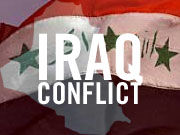| Iraq Conflict |
Audio
Photos
Resources
Your Voice
| |||||||||||||||||||||||
Will war worsen the nurse shortage?
March 10, 2003
Many employers are dealing with gaps in their staff caused by the deployment of military reserves in preparation for war. Healthcare providers are especially sensitive because of an already crippling nurse shortage. They were competing with the military before the deployments. The reserves offer impressive signing bonuses to attract more nurses from the civilian sector.
Rochester, Minn. — Hospitals in Minnesota are currently short around 3,000 nurses. According to the Minnesota Nurses Association, this number will jump to almost 8,000 by 2020.
"It's already a system depleted of richness of registered nurses," says Minnesota Nurses Association Executive Director Erin Murphy. "Calling up those in active reserve is just going to add more stress to this already stressed system of healthcare delivery in Minnesota."
Nationally, the situation is even more grim.
According to an American Hospital Association survey, hospitals throughout the country face large nursing shortages, with an average of an 11 to 14 percent vacancy rate. That's 120,000 vacancies nationwide.
The federal government predicts this number will surpass 800,000 in less than 20 years. The armed services already employ many health care workers. According to one official, they make up around 15 percent of the Army. This number would most likely increase in the case of war.
|
"Calling up those in active reserve is just going to add more stress to this already stressed system of healthcare delivery in Minnesota."
- Minnesota Nurses Association Executive Director Erin Murphy |
Army Reserve Recruiter Captain Daniel Liedl admits a war would immediately worsen the shortage, but would have many long-term benefits for the region's hospitals.
"We're taking their expertise for a short period of time. The experiences they're going to gain from these deployments will be immense, and they'll take that opportunity and training back to their civilian hospitals, and they'll be able to teach those who stayed behind," says Liedl.
Hospitals were competing with the military for nurses even before war was on the horizon. The military offers signing bonuses and other benefits that, for some nurses, make the reserves a more attractive option.
Kirsten Hermstad has been in the Army Reserves for a year and a half. She is studying to be an anesthetist at Rochester's Mayo Clinic.
"My entire loan, on the date of my loan, will be paid back. So when I get out of school, I'll have zero dollars on my loan. I'm making money going to school," says Hermstad.
As a reservist, Hermstad estimates she makes $36,000 to $40,000 a year for going to graduate school. She gets a thousand dollar-a-month stipend and hourly wages for research and study time. The Army also gives her $50,000 to pay back her student loans.
The armed services need more specialists in anesthesia. Nowadays, a nurse stenethetist who signs up for the reserves will also get a signing bonus of $30,000. Not a bad deal, especially since the average starting wage of a fully-qualified anesthetist is around a $100,000.
But Hermstad says joining the reserves isn't about the money.
"You get promoted up in the ranks, and your pay increases with that. You're encouraged to attend a graduate school of some sort and further your studies in whatever way you choose to do, and you're rewarded for that in the military," says Hermstad.
"I don't see that as much in the civilian world. A lot of my friends who are nurses are still working night shifts from when we graduated six or seven years ago. (They) haven't been able to work past that."
The Minnesota Nurses Association's Erin Murphy says whether nurses join the military or not, the state continues to suffer from a nursing shortage. That remains her primary concern.
|
News Headlines
|
Related Subjects
|


